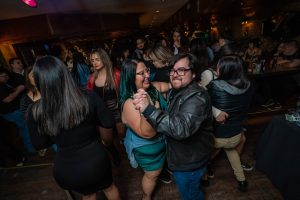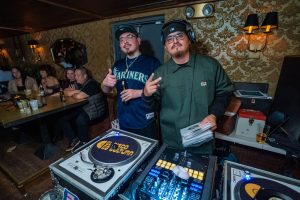- Slug: BC-CNS-Cumbia Scene. 1,360 words.
- 3 photos available (thumbnails and captions below).
By Jacinda Palomo
Cronkite News
PHOENIX — It’s an unmistakable rhythm that catches you by the ear and doesn’t let go. A melody that has the power to instantly guide your feet onto the dance floor. It’s the booming heart of Latin music known as cumbia that a local DJ duo and fusion band are cultivating into a growing Phoenix scene.
“The very first time that you hear it, you know it’s cumbia,” because you get on your feet, explains Rafa Calaka, drummer and founder of the Phoenix band Las Calakas. “It doesn’t matter if you’re sad, if you’re mad, if you’re happy. Once you hear the drums, bass and everything, it just comes in all together and flourishes. It makes you happy, and it makes you dance.”
Cumbia — a percussion-heavy style of Latin music that originated in Colombia — has a distinctive rhythm, with a pattern known as clave, heard in Afro-Cuban music such as reggaeton and reggae.
Today’s cumbia is a melting pot of musical culture. Eduardo Pym and Felix Trejo, Phoenix natives who founded the DJ duo Vinyl Vagos a year ago, found inspiration in their mutual love for the music and its cultural significance to the community.
“It’s important to preserve and to play this for our generation, because the music that we’re playing, it’s nostalgic,” said Trejo, adding Vinyl Vagos is hosting its biggest cumbia event to date — a Selena Birthday Bash in honor of the late American Tejano singer — at Crescent Ballroom in downtown Phoenix on April 15.
Cumbia traces its roots to Colombia’s 19th century African culture. Enslaved Africans who were brought to Colombia and other Caribbean countries created cumbia as a style of courtship dance.
Cultures began to intertwine as Indigenous Colombians added their own instrumental influences, such as drums and flutes. By the 1940s, it had arrived in Mexico with Colombian singer Luis Carlos Meyer Castandet, fusing mariachi music with African, European and Colombian instrumental influences.
“Selena was a major contributor to the popularization of the genre in U.S. Latinx communities before her death,” explained Ilana Luna, associate professor of Latin American Studies and Spanish at Arizona State University, who sees the genre as a cultural staple.
“In general, Phoenix is not one city, it’s many different cities, and many different communities that spring up and sometimes fade,” Luna said. “Perhaps there’s less cumbia and more banda and grupera on the west side, or pop rock en Español in downtown or Scottsdale nightclubs, but cumbias aren’t going anywhere, because they will always be playing in family parties and kickbacks (small gatherings) and at Latin clubs.”
Cumbia has also become a bridge between generations in Latin culture — something that Vinyl Vagos and Las Calakas have found their purpose in.
Pym and Trejo, who met in 2020 as activists working on immigration issues, bonded over their mutual love for collecting rare oldies records from different Latin music genres such as cumbias, Norteñas (a fast-tempo genre typical of northern Mexico), and corridos (traditional Mexican ballads). This led to playing DJ gigs for cafes and restaurants, to officially becoming Vinyl Vagos on April 1, 2022.
The duo defines cumbia as a representation of joy in Latin culture and sees their shows — which include Phoenix venues Linger Longer Lounge, The Womack, The Dirty Drummer and The Lost Leaf — as gatherings where people of all backgrounds can bond over a shared love of music.
“Originally, it was just wanting to play music for people, but then we were like, ‘This is a space where younger generations can come and experience our culture that we grew up with, that our parents exposed us to,’” Pym said.
Pym and Trejo said before they started, Phoenix was lacking a real cumbia music scene. “I’m 27, and when I was 21 up until this point, I don’t think there has been a scene where anyone was doing this,” Trejo said.
Vinyl Vagos hopes to replicate the thriving cumbia scene of neighboring California, where 40 percent of the state’s 39 million residents were Hispanic or Latino in 2022, according to the U.S. Census Bureau. In Arizona, about 32 percent of the state’s 7.4 million residents were Hispanic or Latino that year, compared to more than 42 percent in Phoenix.
“Anyone could speak to the technical part of the music and the type of rhythm and beat it has, but I think to me, it represents waking up on a Saturday morning, like when I hear that music, that cumbia, it’s time to clean the house,” Pym said. “It represents quinceañeras and weddings and like, family parties, and just people dancing and living in joy. We don’t want this culture to die off with the older generations, with our grandparents and parents.”
Las Calakas, a local Chicano cumbia fusion band, has also found inspiration in sharing its love for cumbia with the community. But the band is taking the sound a step further. Originality is something that Las Calakas strives for — only producing music written and composed by its six members. Calaka said he hopes to see new music from more cumbia bands.
“The cumbia scene, it’s starting to grow, but it’s not fully developed yet, because I feel that a lot of these cumbia bands that are around, they mostly play covers.” Calaka said.
“We’ve seen about like two or three bands that have been coming out that are doing the whole fusion stuff, and I love it. I think there is a potential of growth,” Calaka added. “As long as bands just keep on coming out and not following rules of like, you have to play covers, you have to do this. I feel if you’re just an artist and you put the art out there, it will grow. I feel like this is just the start of something that’s going to become really big in Arizona.”
Calaka, who has been playing the drums since he was 9, said his band members have been together for six years and draw from diverse musical backgrounds. The band has played at the Arizona Super Show, a car show and concert at State Farm Stadium, for the past three years, and will return there on April 29.
“I want to say 80% of it, the backbone of it is cumbia, right? But if you listen to everything, there’s rock involved, there’s metal, there’s a little bit of dancehall, there’s hip-hop, and there’s Spanglish.” Calaka said. “That’s a good thing that all six of us bring our own grain of sand to the music, and we just adapt to it and add it on.”
The six-member band — including Calaka, Joseph Sanchez and members who go by stage names Dash, Les, Vic and Rocky — were all born and raised in Phoenix. Calaka gathered longtime friends to form the band because he believes cultivating a strong cumbia scene in Phoenix is important for the culture and brings people together.
“It’s a style of music that when people hear it, they can’t help it. You get up and just move and start dancing,” Calaka said. “Even if some people might not know Spanish or might not even know English, it doesn’t matter, because the music is universal, and that’s what brings everybody together.”
Cumbia is not just a form of music in Latin culture, but also a distinctive form of dance. Dance FX Studios in Mesa has been around for 22 years, and all its instructors are certified to teach cumbia.
“It has its own quirks and style like all dances, but this one is very requested for anyone who grew up in a dancing household,” said Dance FX Studios owner Sierra Graves, who has been teaching for five years. “I enjoy that it brings people and families together.”
While Graves said cumbia is not as popular as the studio’s bachata and salsa classes, she recommends trying it.
“I think cumbia is sprinkled into any Latin dance scene, but it is sometimes forgotten,” Graves said. “I think like anything else, it can become more popular as long as people continue to dance it. We challenge our students as well to always dance in a social setting, so hopefully this spreads the dance.”
For more stories from Cronkite News, visit cronkitenews.azpbs.org.


